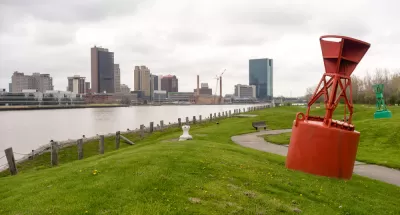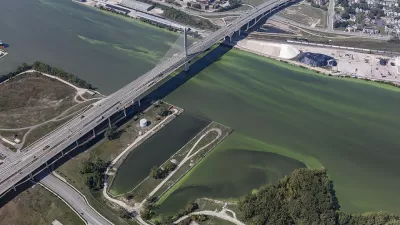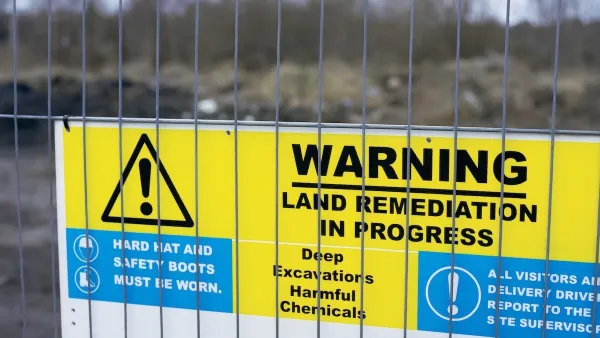Toledo, Ohio held a special election for voters to decide on the Lake Erie Bill of Rights.

As Planetizen previewed late last week, voters considered the Lake Erie Bill of Rights this week, which proposed the legal status of personhood for the environmentally troubled lake.
Voters overwhelmingly approved the idea, according to an article by Tom Henry: "In a special election that drew only about 9 percent of Toledo’s registered voters to the polls, the citizen-led Lake Erie Bill of Rights referendum passed by a 61-39 margin on Tuesday night, according to unofficial election results."
"Toledo represents only a fraction of the entire Lake Erie basin, but it lies along the heart of the western Lake Erie shoreline — the most ecologically fragile and most biologically dynamic part of the Great Lakes basin because of its shallowness and relative warmth. Just outside the Toledo area lies some of North America’s top fishing and birding opportunities," explains Henry of the city of Toledo's stake in the debate.
The approval of the Lake Erie Bill of Rights doesn't entirely resolve the issue, however. "Now, it’s up to lawyers to sort out what the citizenry’s impassioned plea for the lake really means in practice — that is, if it will be more of a symbolic gesture or, as its supporters claim, a new approach to planning and enforcement that will hold more polluters accountable," according to Henry.
An article published by WTVG proves that point, reporting that the Drewes Family Farm in Custar filed the first lawsuit against the Lake Erie Bill of Right in U.S. District Court. "The suit says the Lake Erie Bill of Rights puts the Drewes Family at risk of massive liability if any fertilizer runoff enters the Lake Erie watershed," according to the article.
Additional commentary and insight into the Lake Erie Bill of Rights is available in an article on Vox by Sigal Samuel. The article includes a lot of historical background on the evolving legal question of the rights of nature. Samuel also speculates on the potential effectiveness of this strategy.
FULL STORY: Lake Erie Bill of Rights gets approval from Toledo voters

Maui's Vacation Rental Debate Turns Ugly
Verbal attacks, misinformation campaigns and fistfights plague a high-stakes debate to convert thousands of vacation rentals into long-term housing.

Planetizen Federal Action Tracker
A weekly monitor of how Trump’s orders and actions are impacting planners and planning in America.

San Francisco Suspends Traffic Calming Amidst Record Deaths
Citing “a challenging fiscal landscape,” the city will cease the program on the heels of 42 traffic deaths, including 24 pedestrians.

Defunct Pittsburgh Power Plant to Become Residential Tower
A decommissioned steam heat plant will be redeveloped into almost 100 affordable housing units.

Trump Prompts Restructuring of Transportation Research Board in “Unprecedented Overreach”
The TRB has eliminated more than half of its committees including those focused on climate, equity, and cities.

Amtrak Rolls Out New Orleans to Alabama “Mardi Gras” Train
The new service will operate morning and evening departures between Mobile and New Orleans.
Urban Design for Planners 1: Software Tools
This six-course series explores essential urban design concepts using open source software and equips planners with the tools they need to participate fully in the urban design process.
Planning for Universal Design
Learn the tools for implementing Universal Design in planning regulations.
Heyer Gruel & Associates PA
JM Goldson LLC
Custer County Colorado
City of Camden Redevelopment Agency
City of Astoria
Transportation Research & Education Center (TREC) at Portland State University
Jefferson Parish Government
Camden Redevelopment Agency
City of Claremont




























